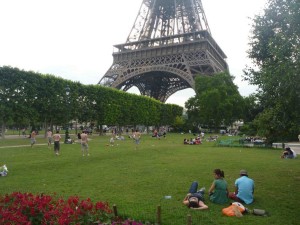In Paris we spent a fair amount of time in the Champ de Mars , the park around the Eiffel Tower. It is a beautiful park with many flowers, trees, and long expanses of beautiful grass leading to the architectural glory of their wonderful tower. Parisian families come to this park all the time, and they bring their children and their dogs.
, the park around the Eiffel Tower. It is a beautiful park with many flowers, trees, and long expanses of beautiful grass leading to the architectural glory of their wonderful tower. Parisian families come to this park all the time, and they bring their children and their dogs.
The first thing we noticed was that the dogs were off-leash most of the time. But here’s the interesting part: The dogs never, and I mean never, hassled us in any way. They did not run into us, they did not bark at us, they did not approach us for food or affection. In fact they showed almost no interest in us. They were completely oriented to their masters and to the other dogs in the park. They played and ran and thoroughly enjoyed themselves in an unfenced area without running off, without barking (except occasional barking when playing with other dogs), and without any aggression that we ever saw. How different from an American dog park!
Then we noticed the children. They sat on blankets with their families, played soccer, and ran around, but again, we did not witness noise or disruption of any kind. They were clearly adored and loved by their parents and grandparents and it was obvious that Parisians are very family-oriented. When there was an upset with a child,  a parent would hold the child and comfort and speak with them until they were calm. They were then placed back on the blanket or the grass and life went on as it had been. But here is the big difference: The children did not speak loudly or harshly toward their parents or toward other adults. In fact, we never witnessed a child being rude to an adult. And like the dogs, they did not hassle us or become a disturbance in any way. How unlike an American park!
a parent would hold the child and comfort and speak with them until they were calm. They were then placed back on the blanket or the grass and life went on as it had been. But here is the big difference: The children did not speak loudly or harshly toward their parents or toward other adults. In fact, we never witnessed a child being rude to an adult. And like the dogs, they did not hassle us or become a disturbance in any way. How unlike an American park!
The common denominator here is the underlying cultural attitude toward dogs and children. I watched carefully as a man was training his new puppy. It was very different from how we train our dogs. He walked slowly with a loose leash. The dog would stop and sniff and the man would wait patiently and then with verbal encouragement for the dog, he moved on, again with a loose leash. Both were utterly content with this situation. There was no pressure, no need to give the dog treats in order to shape its behavior, no tugging on the leash. There was simply the expectation that the dog would conform to the man’s slow patient gait. And it did.
Similarly,  the children in France are absolutely expected to conform to the norms of the adult world. They are quiet and polite and they do not interrupt adult conversations. Their input is not seen as more important than adult input as it often is in our country. They wait to speak until there is a gap in the conversation and what they say does not seem to be regarded in the same way it is in the U.S. Children are listened to, but they do not take over conversations. In other words, they are not the center of attention!
the children in France are absolutely expected to conform to the norms of the adult world. They are quiet and polite and they do not interrupt adult conversations. Their input is not seen as more important than adult input as it often is in our country. They wait to speak until there is a gap in the conversation and what they say does not seem to be regarded in the same way it is in the U.S. Children are listened to, but they do not take over conversations. In other words, they are not the center of attention!
Certainly there are advantages to our system of raising children and dogs. One could speak to the greater sense of importance and independence that our children have for themselves at an early age – some of which is wonderful and some of which leads to all kinds of nasty behavioral consequences. For instance, the incidence of the use of medication for Attention Deficit Hyperactivity Disorder in France is literally 1/18th of that in the United States. Now, of course there could be many factors affecting this statistic, such as diet (the French shop for fresh market food almost every day), a cultural shift away from the use of ADHD medication, types of interventions in school settings, etc. But still, it is an interesting statistic.
Ultimately, it was pure pleasure to walk in the park in Paris. The children and the dogs ran free. And we, we could observe their joyful freedom without ever feeling annoyed by any of it. Lovely.
